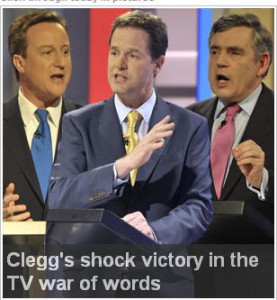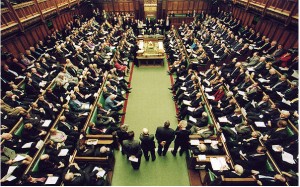In an event purportedly as historic as the first televised US presidential debate between John F. Kennedy and Richard Nixon 50 years ago, the leaders of Britain’s three major parties – Labour’s Gordon Brown, the Conservative’s David Cameron, and the Liberal Democrats’ Nick Clegg – engaged in the country’s first televised election debate in Manchester last night.
 But just as it was with the Kennedy-Nixon debate, the winner, according to a YouGov post-debate poll, was not the candidate who made the best case for his leadership, namely Mr. Brown, but the one who looked most telegenic making his case, Mr. Clegg.
But just as it was with the Kennedy-Nixon debate, the winner, according to a YouGov post-debate poll, was not the candidate who made the best case for his leadership, namely Mr. Brown, but the one who looked most telegenic making his case, Mr. Clegg.
This is not to say, however, that the debate was a total triumph of style over substance. For there was a fair amount of give and take among the candidates on substantive matters of policy, ranging from the economy to immigration and all domestic issues in between. More to the point, each of them demonstrated such command of their respective party’s talking points that one would be hard-pressed to declare a winner based solely on the merits. It was certainly not the “game changer” so many pundits and commentators predicted.
That said, any Briton with only a remote interest in British politics must have found this overhyped debate inherently anticlimactic. After all, what made the first Kennedy-Nixon debate so historic was the fact that it was the first time the vast majority of Americans had ever seen or heard either one of them on TV. By contrast, these candidates have become omnipresent on British TV (even sparring for the cameras on a regular basis during “Prime Minister’s Question Time”). This is why, for the vast majority of Britons, listening to them last night must have been like listening to ex-wives bitch for 90 minutes.
Alas, this brings me back to the matter of style, and to why Clegg probably won. He did a masterful job of staying above the fray and looking at ease (i.e., “presidential”). However, this must have been the debate strategy the American advisors both Cameron and Brown hired (from team Obama) wanted them to execute. Ironically, it was Clegg who ended up giving an Obama-like performance….
 But nothing was more effective during this debate than the way the underdog Clegg proselytized his party’s clean hands, saying, in effect, a pox on both your parties: not only for the MP expenses scandal that has brought parliament into such disrepute, but also for the banking crisis that nearly plunged the economy into the death throes of depression.
But nothing was more effective during this debate than the way the underdog Clegg proselytized his party’s clean hands, saying, in effect, a pox on both your parties: not only for the MP expenses scandal that has brought parliament into such disrepute, but also for the banking crisis that nearly plunged the economy into the death throes of depression.
Meanwhile, far from looking at ease, Cameron seemed to be suffering an acute case of performance anxiety. He was touted as the best debater, but he looked shell shocked throughout – as if his makeup artist injected too much Botox in a vain effort to make him look good.
For his part, at least Brown made up for his dour countenance and soporific voice by letting rip the only zinger of the night, accusing Cameron of airbrushing his policies the way he airbrushed his campaign posters. Moreover, by repeatedly saying, “we agree with Nick,” he shrewdly appealed to the critical mass of voters who are clearly hoping for a hung parliament on the one hand, while flattering Clegg who will be the king maker if (or when) it comes to forming a coalition government on the other.
Finally, I found it particularly interesting to see both Brown and Clegg put Cameron on the defensive for retaining the notorious Lord Ashcroft as party paymaster. For only a month ago, Ashcroft was exposed as a “non-dom” who has been domiciled in the tax haven of Belize over the past decade. This enabled him to avoid paying taxes on income and capital gains on the more than one billion dollars he reportedly earned outside the UK during this period.
I don’t have a dog in this fight. But I think it’s ridiculously premature to be writing Cameron’s political obituary because of his mediocre performance in this one debate. In fact, with all due respect to Clegg’s Obama-like performance, here’s what I wrote about Cameron’s Blair-like trajectory towards national leadership almost five years ago:
This very English man has all the right stuff to be the next Prime Minister of the United Kingdom… He is as young (at 39), telegenic, impudent, and glib as current PM Tony Blair was when he was catapulted to the leadership of the Labour Party at the politically precocious age of 41.
And, if they stick to their let’s emulate Labour’s 1994 to 1997 playbook (1997 being the year Blair upset incumbent PM John Major to win his first election), it’s very likely that the Conservatives will be returned to government – with Cameron moving into No. 10 Downing Street – after the next general elections.
[The next British prime minister, TIJ, December 7, 2005]
Election Day is May 6. May the best man win….
NOTE: Fellow Turks and Caicos Islanders should rest assured there will be no change in Britain’s commitment not only to clean up the political and economic mess in our country but also to fund the prosecution and asset recovery efforts now underway – even if there’s a change in government. For last month’s FAC report on the progress of these efforts reaffirms, beyond all doubt, Britain’s supervening legal and moral obligation to do so.
Related commentaries:
The next British PM…
Britain’s parliament of thieves…
raksha says
This is totally rubbish, you bustards dont have the right to make fun of our prophet muhammad. I got your information and details, I will send you dogs to jail. Rubbish, idiots, bustards